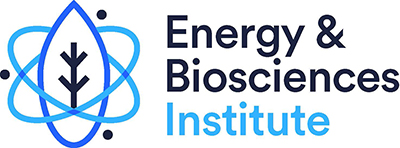Energy & Biosciences Institute

Created in 2007 the Energy & Biosciences Institute (EBI) is multi-institutional partnership between the University of California (UC) Berkeley, Lawrence Berkeley National Laboratory (LBNL), and the University of Illinois at Urbana-Champaign (UIUC). The EBI was the first research institution solely dedicated to the new field of energy bioscience. The original industry sponsor, British Petroleum (BP), supported the institute for ten years with a focus on exploring the application of modern biology to the energy sector.
After restructuring and rebranding to incorporate an expanded energy and biotechnology portfolio, the name of the institute was formally changed to Energy & Biosciences Institute and the mission updated to Research Toward a Clean Energy Future.
The scope of challenges and the potential for research to shape the advanced bioeconomy is large, and the EBI is well-positioned to offer unparalleled access to a large and diverse pool of science and engineering excellence via our unique three-campus partner network. The EBI continues to stand out as a research institute in the way we diversify our research portfolio and program offerings.
In March 2017, the EBI signed a five-year partnership with Shell to fund research aimed at meeting the world’s growing energy demands based on environmentally, socially, and economically responsible practices. This agreement was renewed for another five years in February 2022. The EBI-Shell partnership currently supports a diverse range of projects split among four core research areas: Advanced Separations, Circularity, Hydrogen Supply Chain, and Nature-Based Solutions.
Entrepreneurial Business Incubator & Recharge Facility
With the understanding that steering innovative concepts through development and testing to bring them to market is an exciting yet often challenging process, in 2017 the EBI launched EBI 2 . Based in Koshland Hall on the UC Berkeley campus, EBI 2 promotes research at the forefront of industry development and offers sustainability focused start-ups well-equipped, dedicated research space in which to develop their products. Participating companies also gain access to other UCB resources and expertise, and benefit from frequent contact with other start-up companies forging their own solutions, as well as industry executives, investors and entrepreneurs.
In February 2020, the EBI opened a new recharge facility on campus named EBI Labs. The recharge facility provides scientists and professors access to exclusive and specialized lab equipment such as GC-MS, LC-MS, and the liquid handling system to conduct research and experiments, providing essential services to our campus community.
Structure
The Energy & Biosciences Institute offers the power of three remarkable institutions, three integrated pillars: 1) Core Research, 2) Education & Outreach, and 3) Entrepreneurial Stewardship, and three foundational research areas: 1) Energy Source, Carrier & Storage, 2) Decarbonization, and 3) Natural Resource Management.
The EBI model is different from most academic-industry partnerships that operate under a research consortium model instead industry sponsors can develop unique research portfolios that are firewalled to guaranteed independent access to EBI resources. Additionally, the EBI provides a diverse and customized range of programs designed to meet the unique requirements of our partners. These programs span the entire technology value chain, encompassing everything from supporting fundamental research within established business domains to pinpointing emerging market prospects and technological gaps that can be swiftly transformed into viable commercial ventures within a practical timeframe. At the EBI, industrial sponsors benefit from preferential IP and tech transfer support to facilitate a fast path to commercialization.
With this framework, EBI collaborative partnerships are designed to advance scalable scientific innovation and cross-disciplinary engagement while maintaining equilibrium between economic growth, environmental protection, and societal impact. An overarching theme of the EBI research approach is to perform LCA and TEA (Lifecycle Analysis and Techno-Economic Assessment) to assess the environmental impacts and economic viability associated with any emerging technologies.
Governance
Reinstated in 2019, the EBI Executive Committee provides operational and strategic planning, and is mostly composed of field leaders pooled from our partner network. The composition certifies that different areas of interest and expertise are well-represented. A new Advisory Board will be formalized in 2024, comprised of experts from both industry and academia.


